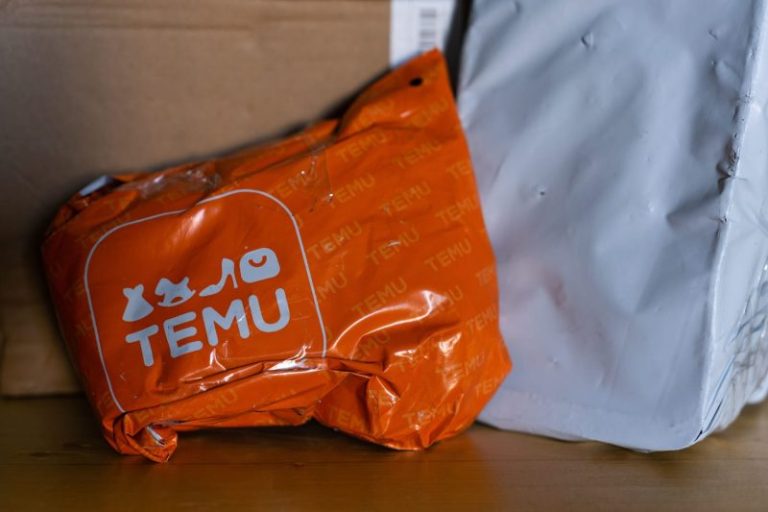Chinese online retailer Temu, whose “Shop like a billionaire” marketing campaign made its way to last year’s Super Bowl, has dramatically slashed its online ad spending in the U.S. and seen its ranking in Apple’s App Store plunge following President Donald Trump’s sweeping tariffs on trade partners.
Temu, which is owned by Chinese e-commerce giant PDD Holdings, had been on an online advertising blitz in recent years in a bid to attract deal-hungry American shoppers to its site. With hefty spending on TV ads as well across Facebook, the company promoted clothing, jewelry, home goods and electronics at bargain basement prices.
The strategy was so effective that Temu topped Apple’s list of the most downloaded free apps in the U.S. for the past two years. Downloads of Temu on Apple’s App Store have fallen 62% in recent days, according to data from SimilarWeb, a digital data and analytics company. Ads for 50-cent eyebrow trimmers and $5 t-shirts that used to blanket Google search results and Facebook feeds have all but disappeared.
President Trump’s tariffs have upended Temu’s business model, along with its advertising strategy. Packages shipped from China are now subject to a tariff rate of 145%, while the de minimis provision, which allows shipments worth less than $800 to enter the country duty-free, is set to go away on May 2.
Temu and Shein, a fast-fashion marketplace with ties to China, plan to raise their prices in response to the tariffs. Both companies posted notices to their websites in recent days that warned they’ll be raising prices late next week.
“Due to recent changes in global trade rules and tariffs, our operating expenses have gone up,” Temu said on its site. “To keep offering the products you love without compromising on quality, we will be making price adjustments starting April 25, 2025.”
Sellers on Amazon’s third-party marketplace, many of whom source their products from China, have said they’re considering raising prices as they reckon with higher costs from the tariffs. Many businesses on TikTok Shop, the social media app’s marketplace, also count on Chinese manufacturers for their items.
Amazon launched a competitor to Temu last November, called Amazon Haul, which features items under $20 that are largely from China.
The Temu app is now No. 69 in a list of the top free apps in the U.S., after consistently ranking in the top 10, according to data from Sensor Tower. Shein is currently at 42, down from 15 last month. PDD’s shares that trade in the U.S. have plummeted 22% this month, compared to the Nasdaq’s 6% drop. Shein is privately held.
Rival Chinese retailers have subsequently risen to the top of the app store ranks, including Beijing-based wholesaler DHgate, which surged to the No. 2 top free iPhone app in the U.S., and Alibaba’s Taobao, which ranked No. 7. Bloomberg reported on Tuesday that viral videos promoting their cheap products have spurred the download frenzy.
A separate analysis by SimilarWeb showed Temu’s paid traffic, or search, display and social media advertising that drove visits to its website, has dropped 77% since April 11. Temu’s paid traffic previously outpaced nonpaid traffic to its website by 2 1/2 times, Ben Parkes, a consumer goods and retail analyst at Similarweb, said in an interview.
Marketing firm Tinuiti found that 20% of U.S. Google Shopping ad impressions were bought by Temu on April 5. A week later, that number had fallen to zero. By comparison, Shein’s impressions remained at 17% on April 12, while 60% of impressions were bought by Amazon.
Representatives from Temu and Shein didn’t immediately respond to requests for comment.
Temu was previously one of Meta’s largest advertisers, but it appears to have dramatically scaled back its spending on the platform. As of Wednesday, Temu is running six ads across Meta platforms in the U.S., a review of Meta’s ad library shows. Temu is running approximately 27,000 ads across Meta sites and apps globally, particularly in Europe and the U.K.
That could be troublesome for Meta’s advertising business, which has gotten a significant boost from the discount retailer. Advertising analyst Brian Wieser at Madison and Wall estimated that more than $7 billion of Meta’s $132 billion in ad revenue in 2023 came from China. Meta is scheduled to report first-quarter results on April 30.
E-commerce analyst Juozas Kaziukenas said he expects Temu to turn its ads back on in the U.S. at some point, but that the company appears to be shifting its dollars to other markets in the interim.
“It doesn’t mean Temu usage has dropped as significantly as the app did,” Kaziukenas said in an email. “But it means that new user acquisition is gone.”
This post appeared first on NBC NEWS





